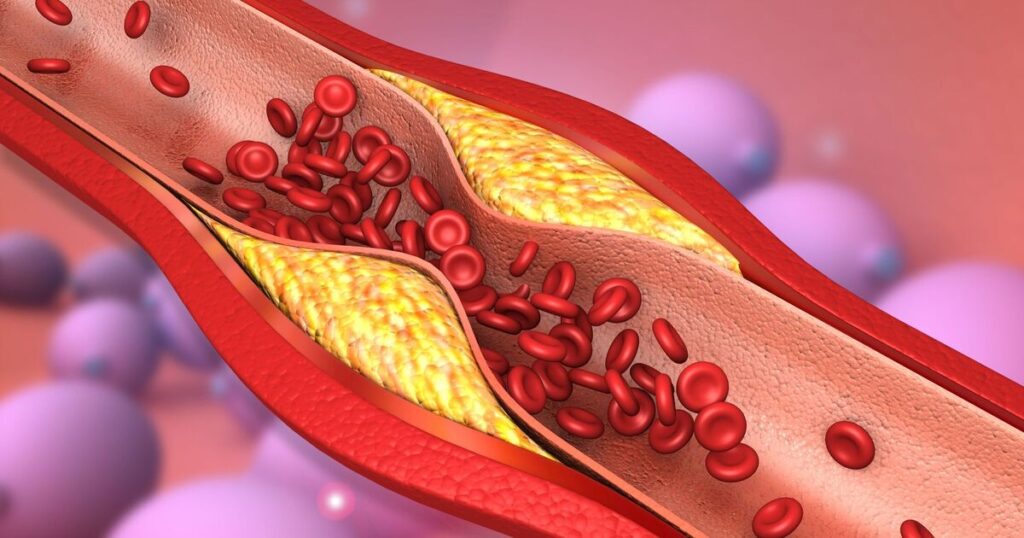
A new health revelation suggests that a specific superfood could outperform aspirin in maintaining clear arteries. Dr. Eric Berg, a ketosis specialist and popular health educator with a substantial following of 13.5 million subscribers on YouTube, has advocated for this ‘number one’ food, claiming it can clear arteries more effectively than aspirin.
Maintaining unobstructed arteries is critical for health, as clogged arteries impede blood flow, increasing the risk of heart attacks, strokes, and other cardiovascular issues. The superfood in question is said to naturally clean arteries without the adverse effects associated with some medications.
The Challenge of Atherosclerosis
Atherosclerosis, characterized by plaque buildup within the arteries, poses a significant health threat. This plaque, known as atheroma, consists mainly of ‘bad’ cholesterol (LDL cholesterol), fatty substances, cellular waste, calcium, and fibrin. When plaque accumulates, it can narrow or block arteries, potentially leading to heart attacks or strokes if it occurs in the coronary or brain arteries, respectively.
According to Surrey Live, about 40% of heart attacks occur between 6 a.m. and noon, a period marked by natural increases in cortisol and adrenaline, which can heighten blood clotting risks. These physiological changes, combined with plaque buildup, amplify the threat of cardiovascular events.
Understanding the Role of Aspirin
Aspirin is widely used as an antiplatelet medication to prevent blood clots from forming in narrowed arteries, thereby reducing the risk of heart attacks and strokes. However, aspirin does not directly address the underlying plaque causing blockages. Instead, it manages the risk of complications arising from these blockages.
“Aspirin can help with clogged arteries, but it doesn’t directly treat the blockage,” notes Dr. Berg. “It’s crucial to seek advice from a healthcare professional before starting aspirin therapy, as it can cause side effects such as stomach bleeding.”
Dr. Berg’s Superfood Solution
While aspirin remains a staple in cardiovascular care, Dr. Berg suggests eicosapentaenoic acid (EPA), an omega-3 fatty acid, as a natural alternative. EPA is recognized for its ability to reduce triglyceride levels and decrease non-HDL cholesterol, including LDL.
Dr. Berg explains, “EPA helps prevent blocked arteries by making your platelets less sticky. Research has shown that EPA can thin the blood comparably to low-dose aspirin.” He further cites a 2019 study indicating that individuals consuming EPA experienced a significant reduction in plaque, decreased inflammation, and fewer cardiovascular events.
“Cod liver oil or cod liver is the best food to unclog your arteries naturally,” Dr. Berg asserts, pointing to salmon, mackerel, and other fatty fish as excellent EPA sources.
Causes and Risk Factors of Arterial Blockages
- Excessive ‘bad’ cholesterol (LDL) leading to plaque formation.
- High blood pressure damaging artery walls.
- Smoking introducing toxins and promoting inflammation.
- Diabetes increasing plaque accumulation risks.
- Obesity contributing to high cholesterol and blood pressure.
- Sedentary lifestyle exacerbating weight gain and cholesterol levels.
- Genetic predisposition to heart disease.
- Aging naturally increasing atherosclerosis risk.
- Persistent stress triggering inflammation and plaque buildup.
Looking Forward: Balancing Diet and Medication
As the conversation around heart health continues, the debate between natural remedies and pharmaceutical interventions remains central. While Dr. Berg’s recommendations highlight the potential of dietary solutions, healthcare professionals emphasize the importance of personalized medical advice.
For those considering alternatives to aspirin, consulting with a healthcare provider is essential, particularly for individuals with existing heart conditions or those at risk of bleeding. The integration of a balanced diet rich in omega-3 fatty acids, alongside medical guidance, could offer a comprehensive approach to cardiovascular health.
As research progresses, the potential of superfoods like those rich in EPA to contribute to heart health without the side effects of traditional medications remains a promising avenue for further exploration.







